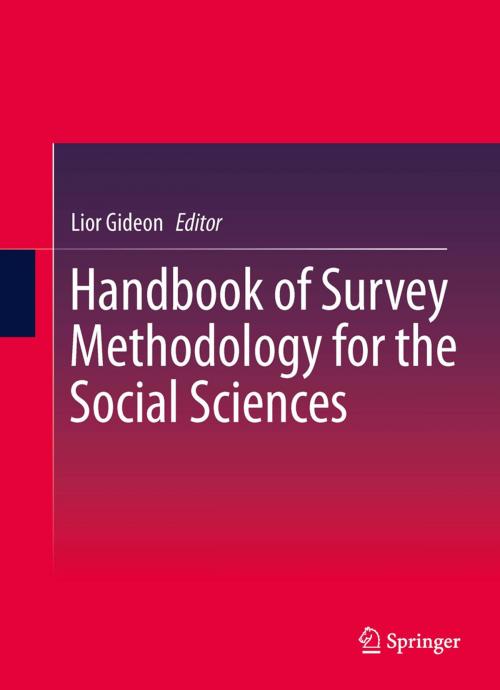Handbook of Survey Methodology for the Social Sciences
Nonfiction, Social & Cultural Studies, Social Science, Methodology| Author: | ISBN: | 9781461438762 | |
| Publisher: | Springer New York | Publication: | June 21, 2012 |
| Imprint: | Springer | Language: | English |
| Author: | |
| ISBN: | 9781461438762 |
| Publisher: | Springer New York |
| Publication: | June 21, 2012 |
| Imprint: | Springer |
| Language: | English |
Surveys enjoy great ubiquity among data collection methods in social research: they are flexible in questioning techniques, in the amount of questions asked, in the topics covered, and in the various ways of interactions with respondents. Surveys are also the preferred method by many researchers in the social sciences due to their ability to provide quick profiles and results. Because they are so commonly used and fairly easy to administer, surveys are often thought to be easily thrown together. But designing an effective survey that yields reliable and valid results takes more than merely asking questions and waiting for the answers to arrive. Geared to the non-statistician, the Handbook of Survey Methodology in Social Sciences addresses issues throughout all phases of survey design and implementation. Chapters examine the major survey methods of data collection, providing expert guidelines for asking targeted questions, improving accuracy and quality of responses, while reducing sampling and non-sampling bias. Relying on the Total Survey Error theory, various issues of both sampling and non-sampling sources of error are explored and discussed. By covering all aspects of the topic, the Handbook is suited to readers taking their first steps in survey methodology, as well as to those already involved in survey design and execution, and to those currently in training. Featured in the Handbook: • The Total Survey Error: sampling and non-sampling errors. • Survey sampling techniques. • The art of question phrasing. • Techniques for increasing response rates • A question of ethics: what is allowed in survey research? • Survey design: face-to-face, phone, mail, e-mail, online, computer-assisted.? • Dealing with sensitive issues in surveys. • Demographics of respondents: implications for future survey research. • Dealing with nonresponse, and nonresponse bias The Handbook of Survey Methodology in Social Sciences offers how-to clarity for researchers in the social and behavioral sciences and related disciplines, including sociology, criminology, criminal justice, social psychology, education, public health, political science, management, and many other disciplines relying on survey methodology as one of their main data collection tools.
Surveys enjoy great ubiquity among data collection methods in social research: they are flexible in questioning techniques, in the amount of questions asked, in the topics covered, and in the various ways of interactions with respondents. Surveys are also the preferred method by many researchers in the social sciences due to their ability to provide quick profiles and results. Because they are so commonly used and fairly easy to administer, surveys are often thought to be easily thrown together. But designing an effective survey that yields reliable and valid results takes more than merely asking questions and waiting for the answers to arrive. Geared to the non-statistician, the Handbook of Survey Methodology in Social Sciences addresses issues throughout all phases of survey design and implementation. Chapters examine the major survey methods of data collection, providing expert guidelines for asking targeted questions, improving accuracy and quality of responses, while reducing sampling and non-sampling bias. Relying on the Total Survey Error theory, various issues of both sampling and non-sampling sources of error are explored and discussed. By covering all aspects of the topic, the Handbook is suited to readers taking their first steps in survey methodology, as well as to those already involved in survey design and execution, and to those currently in training. Featured in the Handbook: • The Total Survey Error: sampling and non-sampling errors. • Survey sampling techniques. • The art of question phrasing. • Techniques for increasing response rates • A question of ethics: what is allowed in survey research? • Survey design: face-to-face, phone, mail, e-mail, online, computer-assisted.? • Dealing with sensitive issues in surveys. • Demographics of respondents: implications for future survey research. • Dealing with nonresponse, and nonresponse bias The Handbook of Survey Methodology in Social Sciences offers how-to clarity for researchers in the social and behavioral sciences and related disciplines, including sociology, criminology, criminal justice, social psychology, education, public health, political science, management, and many other disciplines relying on survey methodology as one of their main data collection tools.















